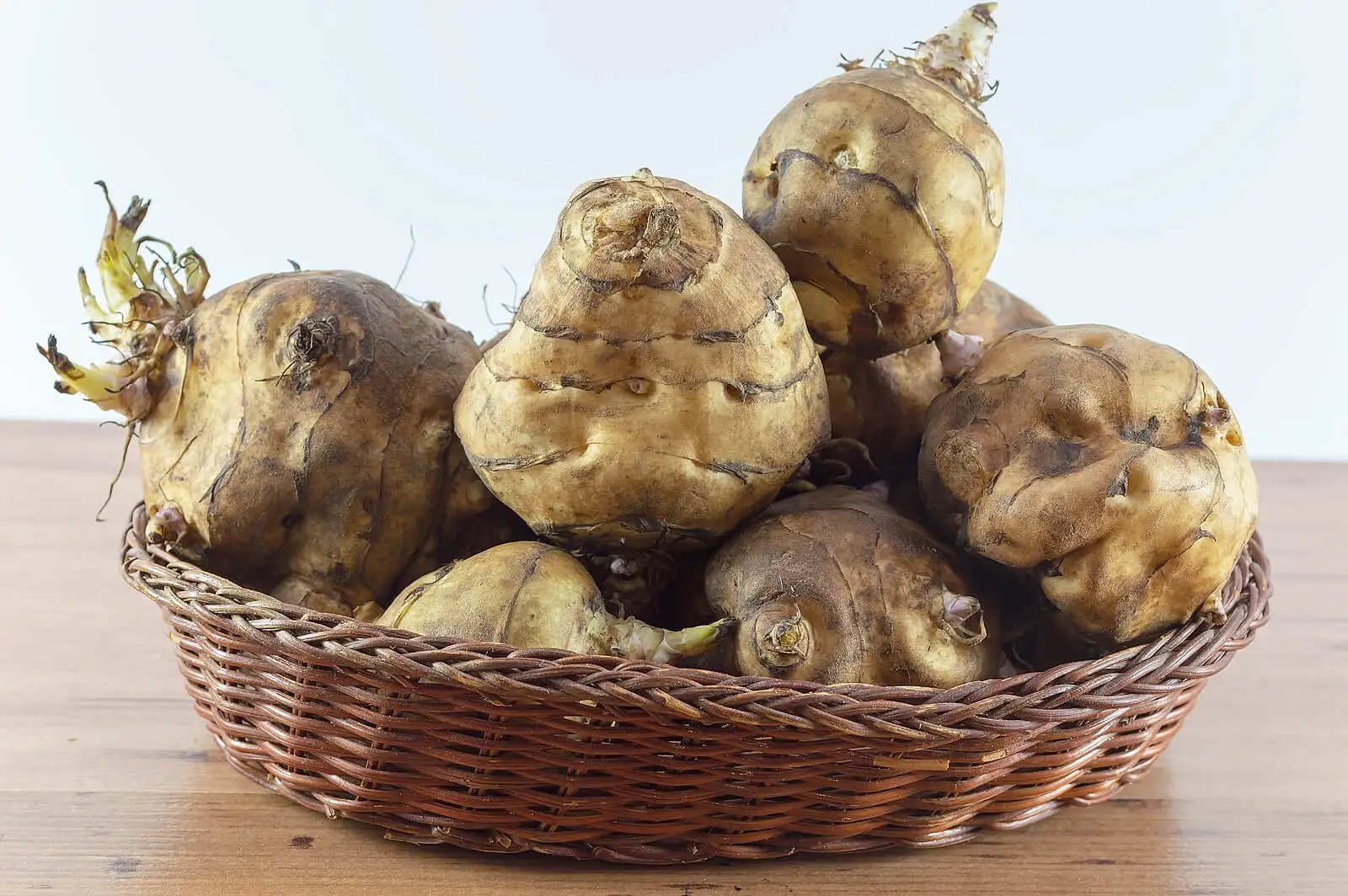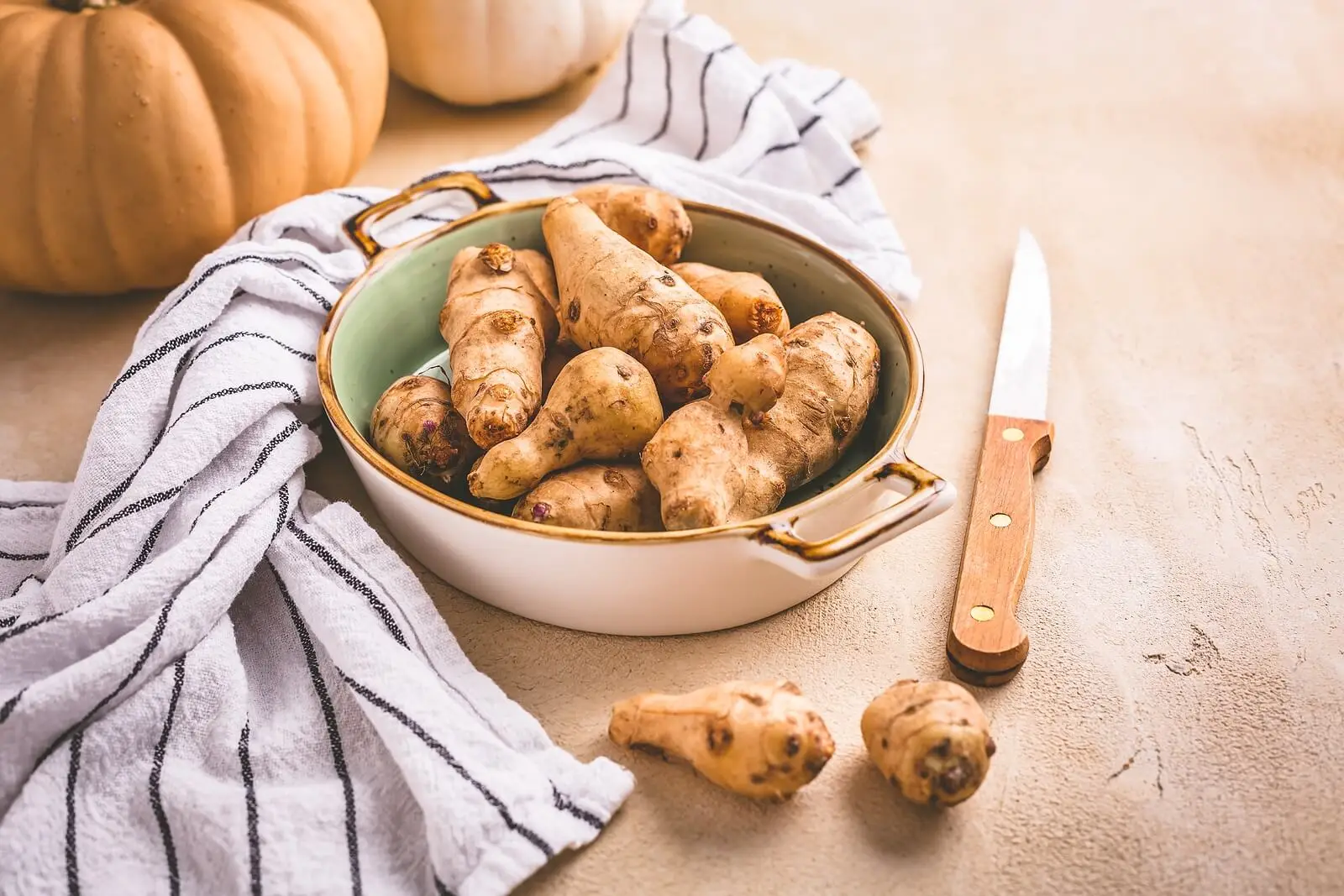The Jerusalem Artichoke: Nutrition, Uses and a Recipe


Written and verified by the nutritionist Maria Patricia Pinero Corredor
The Jerusalem artichoke is a tuber from South America. It’s known for its beautiful sunflower-shaped flowers, but more for the properties of its root. In particular, people have attributed diuretic, aphrodisiac and anti-diabetic qualities to it, among other things.
One of its main characteristics is that it doesn’t contain starch, although it does contain sugars. In fact, another of its names is “sweet potato cane”. What are its uses? How is it prepared? Don’t miss this article as we tell you all about it.
Characteristics of the Jerusalem artichoke
The Jerusalem artichoke plant (scientific name Helianthus tuberosus), is able to grow in quite adverse conditions. However, as with all plants, soil quality is essential. Once it reaches two meters (6.6 feet) in height, it can be said to be mature.
These tubers are usually white, purple or red, with a length of between 7 and 10 centimeters by 3 or 5 centimeters wide (3 to 4 inches by 1 to 2 inches). It can multiply naturally and quickly, and, because of this, the crop should be controlled so that it doesn’t invade other plants and vegetables in a vegetable garden.

Nutritional value of the Jerusalem artichoke
The Jerusalem artichoke is abundant in sugars; each 100 grams (4 oz) contains 9.6 grams (0.33 oz). In addition, it provides the following:
- 2 grams of protein
- 17.6 g of carbohydrates
- 1.6 g of fiber
- 429 milligrams of potassium
- 78 milligrams of phosphorus
- 17 milligrams of magnesium
- 14 milligrams of calcium
- 4 milligrams of sodium
- 3.4 milligrams of iron
In addition to the above, it also provides vitamins. To be more precise, 4 milligrams of vitamin C, 1.3 of niacin or vitamin B3, and 13 micrograms of vitamin B9.
Among other things, it contains 30 milligrams of choline, a nutrient that the brain and nervous system use to regulate memory, mood, and muscle control. It even intervenes in the formation of the membranes that surround the body’s cells.
Properties of the Jerusalem artichoke
Although the Jerusalem artichoke isn’t a miracle remedy or a first-choice treatment against diseases, its consumption is associated with certain health benefits. Below, we’ll reveal them in detail.
Suitable for patients with diabetes
Diabetes mellitus is a disease in which blood sugar isn’t transported into the cells, and the blood glucose level remains high. There are two types; one in which the insulin the body produces isn’t sufficient and another in which the body doesn’t respond correctly.
Inulin and fructooligosaccharides, which are soluble fiber, aren’t absorbed into the intestine and don’t affect insulin levels. Therefore, foods abundant in inulin, such as the Jerusalem artichoke help restore blood sugar levels.
You may be interested in this article: Nutrition and Management of Type 2 Diabetes: Recommendations and More
Prebiotics
Prebiotics are foods that act as nutrients for bacteria living in the small and large intestine. The inulin present in the Jerusalem artichoke is neither digested nor absorbed in the small intestine. 89% of it reaches the colon and becomes a fermentable substrate for bacteria.
In addition, they also become probiotics. These are living organisms, usually bacteria, that are added to the population of healthy microbes in the intestine. They’re usually called bifidobacteria. Prebiotic inulin supplements are added to non-probiotic foods to stimulate bifidobacteria activity.
Can help with bone health
Inulin from the Jerusalem artichoke aids in calcium absorption. This mineral plays an important role in the prevention of bone problems.
Human studies suggest that inulin improves calcium assimilation in adolescents and postmenopausal women. In addition, in animals it increased bone mineralization and density.
Read more in this great article: The Consequences of Calcium Deficiency
Maintains low cholesterol levels
The inulin and soluble fiber in Jerusalem artichoke may reduce the risk of heart disease. This is because they help lower triglyceride and cholesterol levels.
Under normal conditions, the liver converts cholesterol into bile salts. These are released into the small intestine and aid in the digestion of fats. They’re then reabsorbed into the small intestine and recycled in the liver.
Soluble fibers surround the bile salts and prevent their reabsorption. Thus, the liver produces more of these substances to replace them in the feces. In this way, it will use more cholesterol to form more bile salts and blood levels will decrease.
How to use the Jerusalem artichoke in cooking?
This unique tuber can be prepared in a variety of ways. It can be boiled in stews, eaten on its own, or accompanied with butter and spices. Here we’ll tell you how you can prepare it as a cream.
Ingredients
- Extra virgin olive oil
- One medium onion
- A Jerusalem artichoke cut into pieces
- Chopped carrot
- Fresh rosemary
- Water
- Salt

Instructions
- To begin, chop the onion finely and sauté it in the oil.
- Then cook the peeled Jerusalem artichoke together with the carrot. Add some salt and rosemary to the water. Let it cook for 10 to 15 minutes.
- When they’re tender, remove the rosemary and blend everything in a blender. You can add milk, if you wish.
- And that’s it! All you have to do is enjoy it.
What should you remember about the Jerusalem artichoke?
Although it isn’t very well known, the Jerusalem artichoke boasts some very interesting nutritional properties. Its abundant inulin content makes it an ally for well-being. It acts as a prebiotic, antidiabetic and lipid-lowering agent. It’s also versatile and can be included in a wide variety of recipes. What’s stopping you from trying it?!
All cited sources were thoroughly reviewed by our team to ensure their quality, reliability, currency, and validity. The bibliography of this article was considered reliable and of academic or scientific accuracy.
- Tessaro S. ALIMENTO CON ALTO CONTENIDO DE FRUCTANOS: PURÉ DE TOPINAMBUR. 2014. Facultad de Ciencias Agrarias, Universidad Nacional de Cuyo.
- USDA. Jerusalem-artichokes, raw. 2019. Disponible en https://fdc.nal.usda.gov/fdc-app.html#/food-details/169236/nutrients
- NHI. Colina. 2019. Disponible en https://ods.od.nih.gov/factsheets/Choline-DatosEnEspanol/
-
Bakirhan H, Karabudak E. Effects of inulin on calcium metabolism and bone health. Int J Vitam Nutr Res. 2021 Feb 22:1-12. doi: 10.1024/0300-9831/a000700. Epub ahead of print. PMID: 33611985.
- Bosscher, D., Van Loo, J., & Franck, A. (2006). Inulin and oligofructose as functional ingredients to improve bone mineralization. In International Dairy Journal (Vol. 16, Issue 9, pp. 1092–1097). Elsevier BV. https://doi.org/10.1016/j.idairyj.2005.10.028
This text is provided for informational purposes only and does not replace consultation with a professional. If in doubt, consult your specialist.








